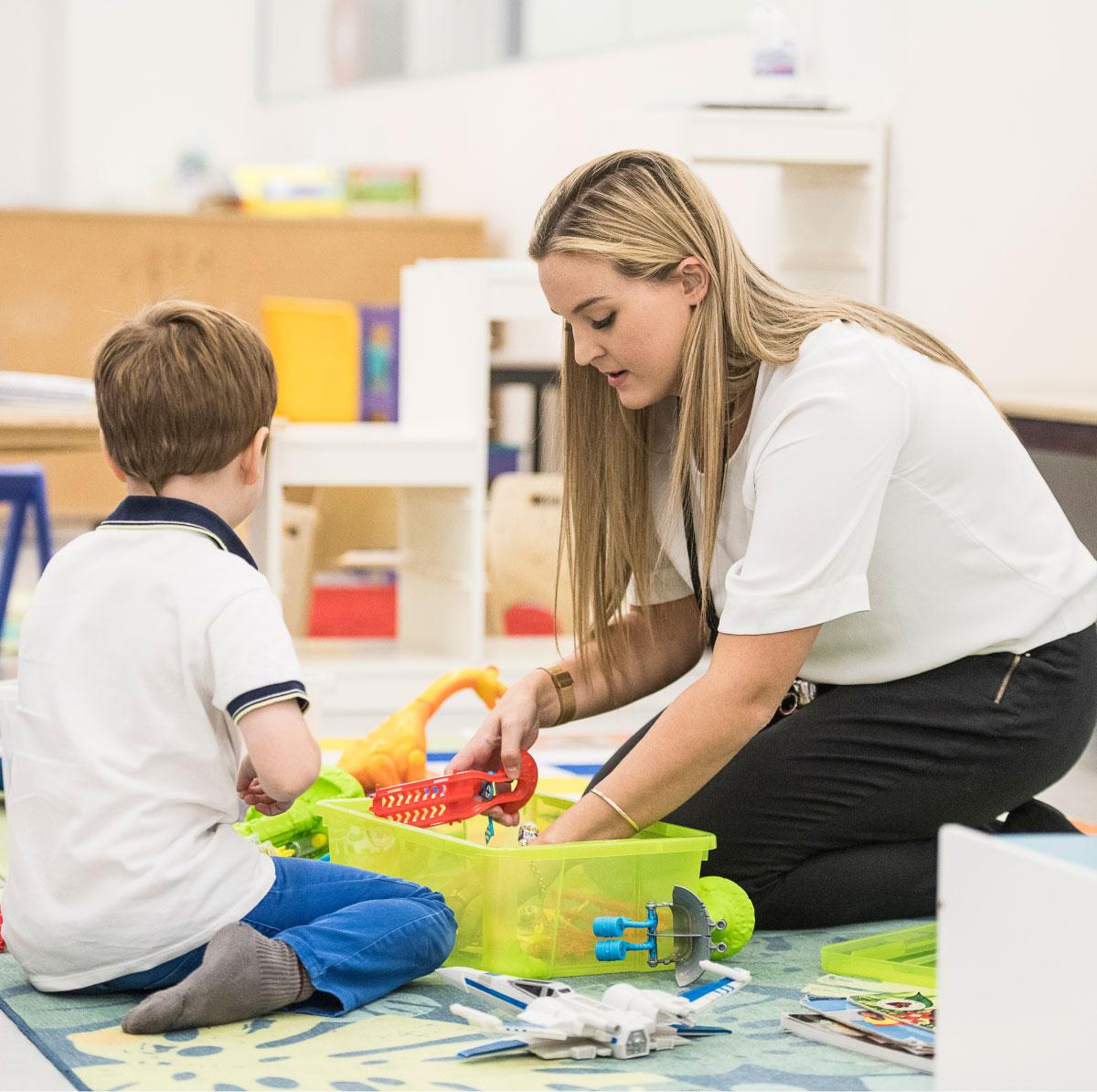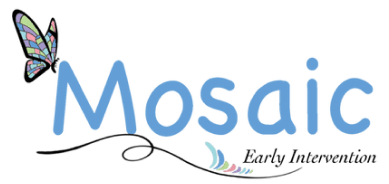Helping Children with Autism Spectrum Disorder (ASD) in the Sutherland Shire
Mosaic Early Intervention provides scientific, evidence-based programs for children with Autism Spectrum Disorder, in the Sutherland Shire and surrounding suburbs, so that they can overcome obstacles and close the skills gap between them and their peers.
What Is Autism?
Autism Spectrum Disorder or ASD is characterised by difficulty communicating, repetitive or restrictive patterns of behaviour and social difficulties.
At this stage, there is evidence suggesting that Autism Spectrum Disorder is likely caused by a combination of genetic, non-genetic and environmental factors.
It is an area that we are still heavily researching to find more answers.
When Does Autism Appear?
Around 12-18 months some parents will notice a few delays, but they are sometimes hard to notice and can easily be missed. From 18 months of age, children typically start to develop more complex social and communication skills and if they start to miss some of these key milestones, parents may begin to notice a delay.

What Are the Signs?
The signs can be varied depending on the child, however some common ones include:
- Avoiding eye contact,
- Limited communication skills (e.g., does not babble or speak),
- Does not respond to sounds (e.g., does not turn head to location of a loud noise or a familiar voice),
- Difficulty moving around (e.g., does not crawl or walk),
- Does not imitate others (e.g., waving or clapping),
- Does not use gestures (e.g., reaching or pointing to preferred items),
- Fixations on or repetitive behaviours with non-functional items (e.g., may show minimal interest in toys but increased interest on other household items OR may be fixated on one particular toy and does not play with other toys).
It’s important to note that all children are different and some don’t engage in some of these behaviours. Signs of ASD vary among individuals, so some signs are really clear and others are less obvious.
Will I be covered by the NDIS?
Autism can not be cured, however, you can reduce the difficulties caused by autism through evidence-based therapies. Children with autism can live very happy, positive lives when they reach evidence-based therapies early on.
How Can Mosaic Early Intervention Help My Child?
By providing a tailored, evidence-based program for your child’s needs, you will see positive results and an improvement in everyday life for both your child and those around them.
These individualised programs reduce the barriers that a child with autism faces on a daily basis and equips them with the skills they need to interact with their family, peers and educators.
Our programs are very much play-based and we find our kids respond really well to these sessions. We visit your child at home and at daycare or school; working with all the key people in your child’s life, to demonstrate how to teach your child in a way they will understand.
Using a scientific approach, ABA or Applied Behaviour Analysis can address:
- All developmental domains,
- Communication, social skills and foundational learning to learn skills,
- Challenging behaviours – by providing behaviour support plans, and
- Reducing challenging behaviours by replacing them with appropriate replacement behaviours. For example: instead of screaming, replace with something more appropriate such as requesting for preferred items or activities.

Our programs are intensive, and highly effective. Our team will support your child across all areas and aspects of their life, including:
• Supporting parents, educators, teachers, family and everyone else in your child’s life to interact with them in a positive and helpful way,
• Supporting your child to learn across various education environments,
• Learning new skills across all domains and reducing barriers to learning,
• Helping them access different community locations successfully; and
• Learning from a less restrictive environment.
Do I Need a Diagnosis to Access Mosaic Early Intervention Services?
No, a diagnosis is not essential to access our services, however a diagnosis means you can apply for NDIS funding, which may cover the fees required for your child’s program.
In order to receive a ASD diagnosis, a full assessment from a qualified professional or team of professionals is required. For more information on government funded diagnostic services, please refer to the following link on the raisingchildren.net.au website.
What Can I Expect From the Initial Consultation?
The initial consultation takes place at our clinic in Sutherland with one of our Behaviour Consultants and will take approximately 2 hours.
During the initial consultation we will discuss your child’s current skills (including their developmental history), as well beginning to identify any gaps, skills or barriers to learning that can be improved.
We will also explain in detail how our program works and what the recommendations are, based on the current literature and what we know is best practice.
What Do I Need to Bring?
There’s no need to bring anything to your appointment, however if you have any previous reports please feel free to bring these along.
What Happens During the Second Appointment?
The second appointment is when we begin the initial assessment, which is a play based assessment at our clinic and will run for approximately 2 hours.
After this, future sessions are generally scheduled to take place from your home.
How Long Does A Program Last?
This depends on your child’s individual needs, as each program is highly individualised.
We will fade out of intensive support as your child meets their milestones and when the gap between them and their peers is reduced.
We track progress during each and every session and conduct regular developmental assessments.
This ensures that we can adjust your child’s program to help them progress and enables us to provide an indication of when services can be reduced.
Your Team at Mosaic Early Intervention
One of our Behavioural Consultants will guide and oversee your child’s program, meeting with you at least once a week to review and make changes as required.
They will also meet with educators if your child attends daycare or school.
Your Behavioural Consultant will supervise the Behaviour Technicians (usually 2-3), who deliver the program and provide the bulk of the therapy.
Having a variety of people involved in their program means your child can get used to working with different people and generalising their skills.

What Can I Do As a Parent?
One of the best things you can do is seek early and intensive intervention as this has been shown to have the biggest impact. Parental involvement in our program is important, so we will guide and support you along the way.
A few things you can do when you work with our team:
- You can assist by communicating regularly with your child’s team so that adjustments can be made or issues can be addressed,
- You can provide a therapy space at home,
- You can make enquiries to check if your child’s daycare is open to having therapists in to support them,
- You can support your child along the way and work on their new skills,
- If you have any questions at all, please ask! We are here to help.
Will I be covered by the NDIS?
Families can use their NDIS funding with us provided they are self or plan-managed. Our reporting can help you access this funding and show your child’s progress within our program.
Does the Service Compliment Occupational Therapy or Speech Therapy?
Yes, these services can work very well together and we advocate for a collaborative approach – working together to help your child thrive!
When Can I Expect to See Results?
Every child is different, however, we usually see positive changes within the first 3 months. Early intensive behavioural intervention has been proven to give children the best outcomes when it is commenced in the early years (18 months – 3 years) and is intensive (i.e. 1 on 1 and many hours throughout the week).
If you would like more information or to book in your initial consultation please contact us by completing the form below.
At Mosaic, we understand how difficult it can be to sift through all the information when first receiving a diagnosis or needing support.
For more information please take a look at our FAQ page. If you have any questions or would like to find out more about our service, please get in touch.
